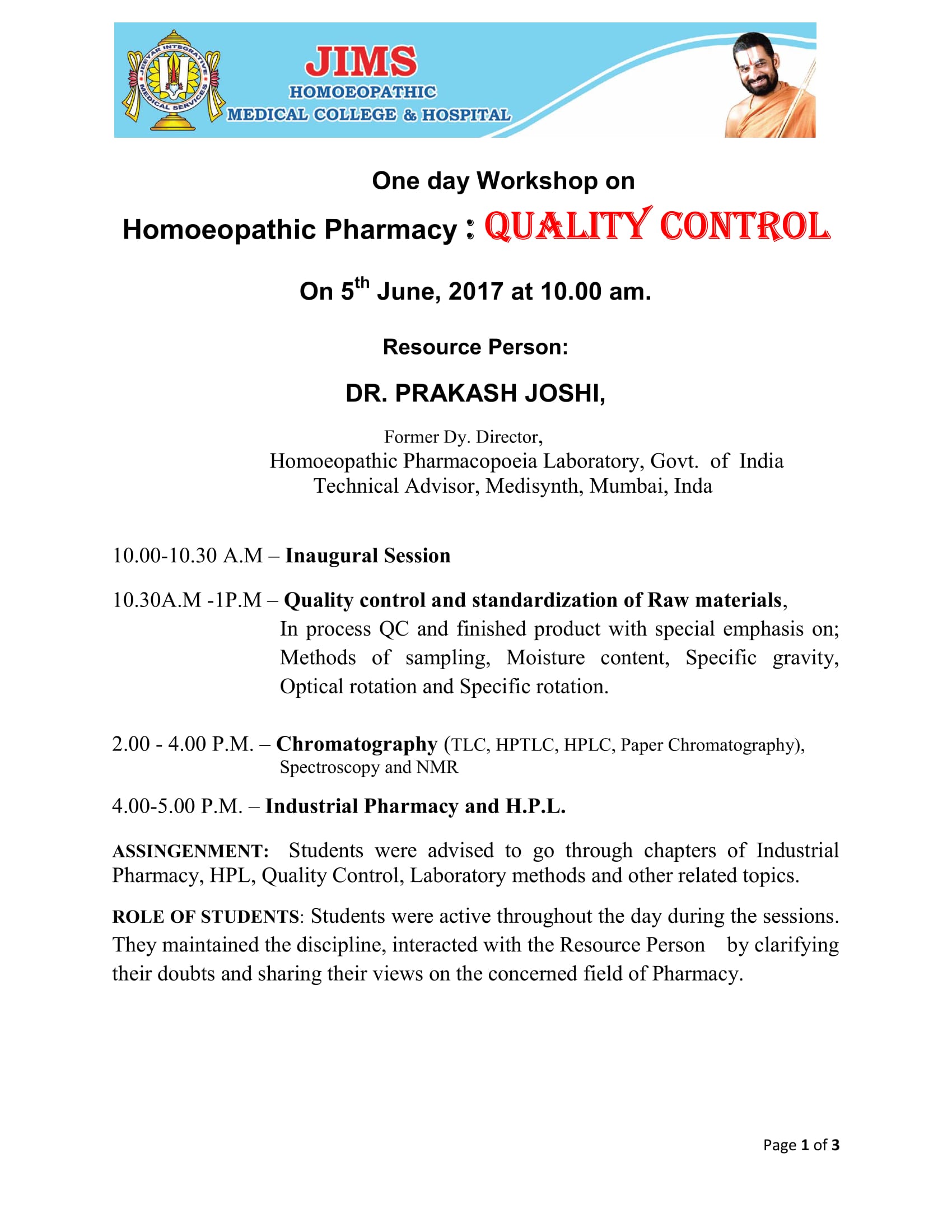On 5th June, 2017 at 10.00 am.
Resource Person:
DR. PRAKASH JOSHI,
Former Dy. Director,
Homoeopathic Pharmacopoeia Laboratory, Govt. of India
Technical Advisor, Medisynth, Mumbai, India
10.00-10.30 A.M – Inaugural Session
10.30A.M -1P.M – Quality control and standardization of Raw materials,
In process QC and finished product with special emphasis on; Methods of sampling, Moisture content, Specific gravity, Optical rotation and Specific rotation.
2.00 – 4.00 P.M. – Chromatography (TLC, HPTLC, HPLC, Paper Chromatography),
Spectroscopy and NMR
4.00-5.00 P.M. – Industrial Pharmacy and H.P.L.
ASSINGENMENT: Students were advised to go through chapters of Industrial Pharmacy, HPL, Quality Control, Laboratory methods and other related topics.
ROLE OF STUDENTS: Students were active throughout the day during the sessions. They maintained the discipline, interacted with the Resource Person by clarifying their doubts and sharing their views on the concerned field of Pharmacy.
Session I :
Dr Prakash Joshi emphasized morphological and microscopic studies of raw plant and animal drug materials and showed the significance of part used with evidence. He then explained on the:
- Diverse therapeutic use of plants referring the active principles of crataegus, aconite, equiseteum etc.
- Knowledge of adulterants.
- Six major points regarding plant material for drug preparation.
- Identification of Genera and species.
- Morphological and organoleptic evaluation.
- Purity and free from admixture.
- Methods of cultivation and its devices.
- Suitable methods of collection and storage.
- Study of constituents.
- Pharmacognostic evaluation of drugs.
- Physicochemical standardization of mother tincture.
- Detection of active principles in medicinal plants.
- Unscientific collection and substitution/ adulteration of herbal raw material from wild sources.
- General research protocol for development of plant drugs.
- Research methodology for quality evaluation of herbal drugs.
He explained about GMP, its definition, need, maintenance, authorities, requirements, scope and validation. He also discussed – how to achieve factory hygiene.
Session II :
Dr Joshi explained in details about the chromatography, TLC, HPTLC, HPLC, Paper chromatography, spectroscopy and NMR. He described procedure of chromatography with chemical and other parameters for identifying raw material with suitable examples like microscopic examination of hydrastis, berberis, chemical examination of hydrastis etc… He showed microscopic features of different plants and there differentiation.
He emphasized on the use of different pharmacopoeia and their importance with various examples. He further discussed on the following topics;
Raw material testing, standard specimen, U.V. spectrophotometer, polarimeter, percolation, pH meter, determination of total solids and alcohol content.
Session III:
Dr Joshi narrated about standard for imported drugs and drugs for manufacture and sale referring the importance of D&C Rule 85E conditions for grant /renewal of license in form 25C, labeling and packing and homeopathic medicine, name of medicines with potency as per pharmacopoeia. Batch/lot number, manufacturing license number.
He mentioned about prohibition of quantity of alcohol percentage not more than 12% and 450 ml of bottle; 5yr expiry date is under review with the Govt. of India.
He appraised about the Production area and layout of GMP installed factory.
The session ended with interactive session involving students and staff regarding various practices in the subject of pharmacy in particular and homoeopathy in general.

